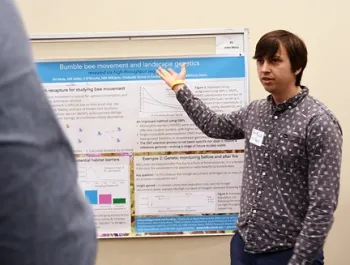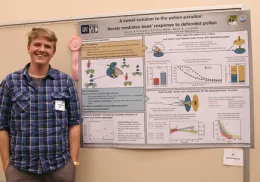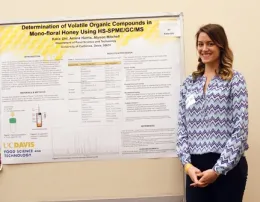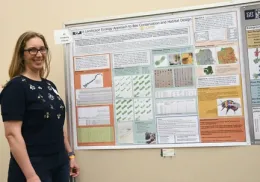John Mola Wins Graduate Student Research Poster Competition at UC Davis Bee Symposium

Judges were Tom Seeley, professor at Cornell University, the symposium's keynote speaker; speaker Santiago Ramirez, assistant professor of evolution and ecology at UC Davis, and native pollinator specialist Robbin Thorp, distinguished emeritus professor at UC Davis. Master beekeeper/journalist Mea McNeil of San Anselmo served as the timer and coordinator for the panel.
“In conservation biology and ecological study, we must know the distances organisms travel and the scales over which they go about their lives,” Mola said of his work. “To properly conserve species, we have to know how much land they need, how close those habitats need to be to each other, and the impact of travel on species success. For instance, if I'm told there's free burritos in the break room, I'm all over it. If the 'free' burritos require me traveling to Scotland, it's not worth it and I would spend more energy (and money) than I would gain. For pollinators, it's especially important we understand their movement since the distances they travel also dictates the quality of the pollination service they provide to crop and wild plants."


Second place of $600 went to Maureen Page, a second-year Ph.D. student in Neal Williams lab for her research, “Impacts of Honey Bee Abundance on the Pollination of Eschscholzia californica (California golden poppy).”
Page presented her research on the impacts of honey bee abundance on native plant pollination. “While honey bees are economically important, they are not native to North America and may have negative impacts on native bees and native plant communities in certain contexts,” she related. “My research is ongoing, but preliminary results suggest that honey bee abundance may negatively affect the pollination of California poppies.”
In her abstract, Page wrote: "Many studies support the claim that introduced honey bees compete with native pollinators. However, little is known about how honey bee introductions will affect native plant communities and plant species' persistence."
Page received her bachelor's degree in biology from Scripps College, Claremont, Calif. in 2006, cum laude. She seeks a career as a professor and principal investigator.

Two graduate students tied for fourth place and each received $250: doctoral student Jacob Francis of the University of Nevada, for his “A Sweet Solution to the Pollen Paradox: Nectar Mediates Bees' Responses to Defended Pollen” and Katie Uhl, a master's student, UC Davis Department of Food Science and Technology, for her “Determination of Volatile Organic Compounds in Mono-Floral Honey Using HS-SPME/GC/MS." Francis studies with major professor Anne Leonard of Ecology, Evoluiton and Conservation Biology. Uhl's major professor is Alyson Mitchell.
Also honored was Kimberly Chacon, a doctoral student in the UC Davis Geography Graduate Group who studies with Professor Steve Greco for her “A Landscape Ecology Approach to Bee Conservation and Habitat Design." She received $150.
The annual Bee Symposium, themed "Keeping Bees Healthy, " is sponsored by the UC Davis Honey and Pollination Center, headed by director Amina Harris, and the UC Davis Department of Entomology and Nematology, chaired by nematologist and professor Steve Nadler.
Harris and Professor Neal Williams of the Department of Entomology and Nematology, who serves as the center's faculty co-chair, emceed the symposium. The symposium drew a crowd of 250 from across the country.
